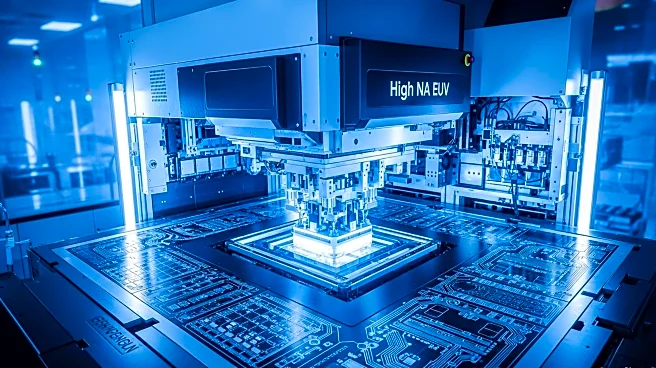What's Happening?
SK hynix has successfully set up a High Numerical Aperture Extreme Ultraviolet (High NA EUV) lithography system for mass production at its M16 fab in Icheon, South Korea. This development marks a significant advancement in chipmaking technology, allowing SK hynix to produce transistors that are 1.7 times smaller and achieve 2.9 times the existing transistor densities compared to previous machines. The new system, a TWINSCAN EXE:5200B, offers a 40% improvement in numerical aperture, enhancing the company's ability to manufacture powerful DRAM chips. SK hynix aims to leverage this technology to strengthen its position in the AI memory market, targeting the growing demand for advanced computing solutions.
Why It's Important?
The introduction of the High NA EUV machine by SK hynix is poised to have a substantial impact on the semiconductor industry, particularly in the realm of AI computing. As the demand for more efficient and powerful memory chips increases, SK hynix's ability to produce these at a lower cost could shift market dynamics, potentially affecting competitors like Intel, Nvidia, and Micron. This technological leap could lead to advancements in AI data centers and gaming PCs, offering enhanced performance and efficiency. The move underscores the importance of cutting-edge manufacturing capabilities in maintaining competitive advantage in the rapidly evolving tech landscape.
What's Next?
SK hynix plans to utilize the High NA EUV machine to mass-produce complex DRAM chips, with initial applications likely in large AI data centers. The company aims to solidify its leadership in the AI memory space, responding to the fast-growing demands of AI and next-generation computing markets. As SK hynix continues to develop and deploy this technology, industry stakeholders will be watching closely to see how it influences market trends and competitive strategies. Potential collaborations or partnerships with other tech giants could also emerge as the company seeks to expand its technological reach.
Beyond the Headlines
The deployment of High NA EUV technology by SK hynix may have broader implications for the semiconductor industry, including ethical considerations around AI development and data privacy. As more powerful chips enable advanced AI capabilities, discussions around responsible AI use and regulation may intensify. Additionally, the environmental impact of increased semiconductor production could become a focal point, prompting industry leaders to explore sustainable manufacturing practices.











